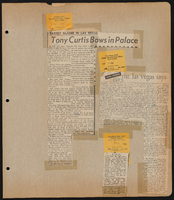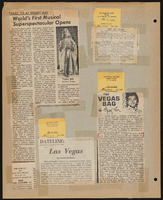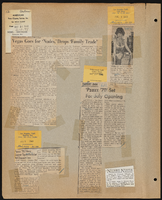Search the Special Collections and Archives Portal
Search Results
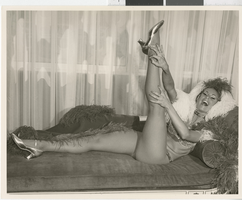
Photograph of Minsky's showgirl posing on a sofa at the Playboy Hotel, Chicago (Ill.), circa 1977
Date
Archival Collection
Description
Image

Photograph of a Minsky's Burlesque showgirl, Playboy Hotel, Chicago (Ill.), circa 1977
Date
Archival Collection
Description
Image

Transcript of interview with Bunny Harris by Kenneth Young, February 28, 1979
Date
Description
On February 28, 1979, collector Kenneth P. Young interviewed office manager and real estate broker, Mrs. Bunny Harris (born November 21st, 1920 in Snyder, Texas) in her home in Las Vegas, Nevada. This interview offers an overview of the history of Las Vegas, including transportation, mining, farming, ranching, and housing. During the interview, Mrs. Bunny Harris discusses the Elks Club, Cashman Field, McCarran Airport, Howard Hughes and Nellis Air Force Base.
Text

Transcript of interview with Mary Ann Culver by Stephen R. Johnson, March 22, 1981
Date
Description
On March 22, 1981, Stephen R. Johnson interviewed his friend, food and beverage cashier, Mary Ann Culver, (born on November 2nd, 1913, in Walton, Indiana) in her home in Las Vegas, Nevada. This interview covers the Union in the 1950s, entertainers, showrooms, strikes, and organized crime. During the interview Mary also discusses Elvis, shows at the Thunderbird, ownership of the Thunderbird, weather, the local bus system, traffic, and Howard Hughes.
Text
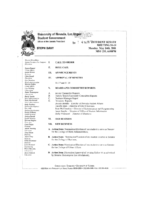
Meeting minutes for Consolidated Student Senate, University of Nevada, Las Vegas, May 14, 2001
Date
Archival Collection
Description
Text

Meeting minutes for Consolidated Student Senate, University of Nevada, Las Vegas, October 29, 2001
Date
Archival Collection
Description
Text

